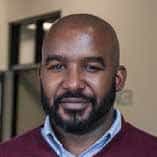The first letter to the church at Corinth was written by Paul, likely while he was spending time in Ephesus. Paul had previously visited Corinth with the hopes of planting a church. His time in Corinth was not uneventful. Jewish leaders accused him of being a rabble-rouser and attempted to get him kicked out of town. Their plan did not work. Paul could stay in Corinth and he continued to spread the gospel. He experienced success and a substantial body of believers formed and worshipped God together.
 Terrell CarterEventually, Paul left Corinth and this group to continue his journey throughout the region sharing God’s love. But he never forgot about them. He regularly communicated with them and received updates on how they were doing.
Terrell CarterEventually, Paul left Corinth and this group to continue his journey throughout the region sharing God’s love. But he never forgot about them. He regularly communicated with them and received updates on how they were doing.
Unfortunately, they were not doing very well without his leadership. The church began to divide for unnecessary reasons. They formed cliques based on who they were baptized by. Those who had been baptized by Paul formed a group. Those who had been baptized by Silas formed a clique. But they did not separate only by who baptized them; there were divisions in the group based on whether they were Jewish and what social class they were in. Some within the group cared about perceived educational differences and thought that they were better than others because of educational attainments.
Paul had a paradox to deal with in the congregation. Some members were still trying to live according to the Jewish law and others wanted to follow the wisdom, philosophies and lifestyles that uplifted power and earthly wisdom that were prevalent within the city of Corinth, while others were willing to live in the ways that Paul taught were pleasing to God.
Corinth was an important seaport city filled with diverse ethnicities and diverse worldviews. Daily, the members of the church saw other people getting rich and living life to the fullest. Those people understood life to be about pleasing self and getting the most out of life through material possessions. And the people that were teaching others to get rich were the most popular teachers in the city. But Paul had taught them that true riches were not found in the things of this world, but in being in relationship with God through Christ.
Paul and the people had a challenge on their hands. They were being asked to believe things and live in ways that were not appreciated in general society. To follow a man that had experienced the most embarrassing type of death — crucifixion. Paul was trying to get them to understand that God’s desires were not expressed through ways that make sense to the world. God’s power and authority were exhibited through what seemed like the weakest way. Sacrificial death for everyone, even for those who would not follow that path.
Despite what the world thinks, God uses unique means and ways to be in relationship with people. God’s desire to be in relationship with the world is best understood through the actions and teachings of Jesus the Christ. This may not always make sense to the world, but God’s wisdom always trumps ours.
The world’s wisdom is not as wise as we think. We expect God to show God’s self through power and authority, but God chose to do it in an unusual way. God makes Godself known in ways and through people that we would never expect. Yes, God may decide to have God’s work done through large and loud actions, but other times, God may decide to do it through poor, uneducated and what we would consider unworthy people and means. Sometimes, that’s not only hard for the world to understand. It can be hard for us, as God’s followers, as well.
Terrell Carter is assistant professor and director of contextualized learning at Central Baptist Theological Seminary in Shawnee, Kan.,and pastor of Webster Groves Baptist Church in Webster Groves, Mo.

